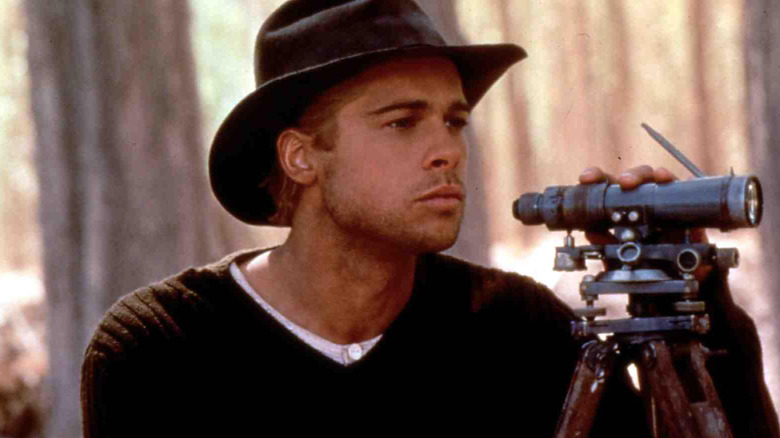The Real Reason Brad Pitt Was Banned From China
The idea of China shunning Hollywood isn't exactly new. The 2020-2021 award season really drove this point home. After "Nomadland" director Chloé Zhao became only the second woman (and the first of Asian descent) to win Best Director at April's Oscars, her birth country was ostensibly withholding on the celebratory front. As The Hollywood Reporter reported, none of China's main publications even reported on Zhao's historic win. A rare article from "Global Times," related via Deadline, mused that while Zhao's multiple Oscar wins were "good... We hope she can become more and more mature." Cold! (The bad blood stems from a 2013 Filmmaker Magazine interview, via THR, in which Zhao described China as "a place where there are lies everywhere.")
In addition to Zhao's icy reception, China had enforced a sweeping draconian crackdown on Oscars 2021 coverage, reported Bloomberg. The Chinese government reportedly ordered local media to avoid "real-time" footage and to "focus on awards that aren't controversial." Per Bloomberg, the problem partially laid with the double-nominated "Mulan," a film criticized for its portrayal of Chinese culture, not least of all by China itself.
Over the years, China has also banned its share of A-listers from entering its borders, such as Harrison Ford for testifying in 1995 before a U.S. Senate committee about the need for Tibetan independence (via Wonderwall). Brad Pitt, who always seems unflappable even facing mounting legal woes in 2021, was once an unlucky member of this club. Find out how Pitt earned his 1997 banishment.
Brad Pitt spent Seven Years in Tibet ... and 19 in banishment
If you are a celebrity and would like to visit China, it is best to just stay clear altogether of the word "Tibet" (and mentions of the "Dalai Lama" while you're at it) — be it in an interview or in a song or movie. That is one lesson Brad Pitt learned the hard way. His 1997 feature "Seven Years in Tibet" starred Pitt in the true story of an Austrian mountain climber who found himself befriending a young Dalai Lama amidst China's 1950s annexation of Tibet. (The People's Republic of China, per China.Org.Cn, refers to that series of events as "the peaceful liberation of Tibet.")
As People reported, the Chinese government did not like the film's portrayal of Chinese rule in Tibet and banned everyone involved, including Pitt. Although, as the magazine noted in 2013, Pitt himself foreshadowed his return, teasing on the popular Chinese social media platform Weibo, "It is the truth. Yup, I'm coming ..." Sure enough, to promote 2016's "Allied," Pitt walked a red carpet in mainland China for the first time in 19 years, CBS reported. What a triumphant story arc! (Although — hey Brad, how come you have a Weibo account but not an official Twitter?)


